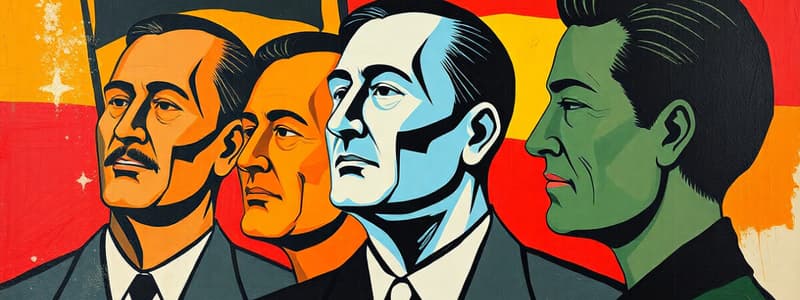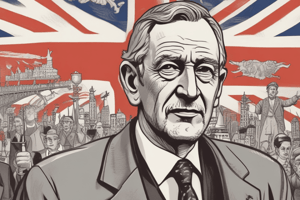Podcast
Questions and Answers
What major political ideology rose as a direct result of the success of the October Revolution in Russia in 1917?
What major political ideology rose as a direct result of the success of the October Revolution in Russia in 1917?
- Socialism (correct)
- Monarchism
- Liberalism
- Totalitarianism
How did nationalists perceive the rise of socialism and communism after World War I?
How did nationalists perceive the rise of socialism and communism after World War I?
- As a threat to national unity (correct)
- As a unifying force
- As a necessary evil
- As an irrelevant movement
What was a common issue faced by veterans returning home after World War I?
What was a common issue faced by veterans returning home after World War I?
- Job opportunities were abundant
- They received generous government support
- They were celebrated with state jobs
- Many found themselves unemployed (correct)
What characterized the global market during the postwar period after World War I?
What characterized the global market during the postwar period after World War I?
What social movement gained momentum alongside socialism after World War I?
What social movement gained momentum alongside socialism after World War I?
Which of the following was an effect of the postwar recession in European countries?
Which of the following was an effect of the postwar recession in European countries?
What often resulted from the neglected social welfare systems for disabled veterans?
What often resulted from the neglected social welfare systems for disabled veterans?
What type of political polarization was evident in Europe after World War I?
What type of political polarization was evident in Europe after World War I?
What were the primary goals of the protests and strikes mentioned?
What were the primary goals of the protests and strikes mentioned?
What role did propaganda play in totalitarian states?
What role did propaganda play in totalitarian states?
How did totalitarian regimes typically restrict personal freedom?
How did totalitarian regimes typically restrict personal freedom?
What was a consequence of the Treaty of Versailles for the Weimar Republic?
What was a consequence of the Treaty of Versailles for the Weimar Republic?
What is a common characteristic of totalitarian states regarding opposition?
What is a common characteristic of totalitarian states regarding opposition?
How did the early 20th-century economic conditions affect the Weimar Republic?
How did the early 20th-century economic conditions affect the Weimar Republic?
What often happens to the government's relationship with enterprises in a totalitarian regime?
What often happens to the government's relationship with enterprises in a totalitarian regime?
What is a feature of personal cults in totalitarian states?
What is a feature of personal cults in totalitarian states?
What financial crisis did the Weimar government face between 1919 and 1923?
What financial crisis did the Weimar government face between 1919 and 1923?
What led to hyperinflation in Germany in 1923?
What led to hyperinflation in Germany in 1923?
In what way did the political landscape change in Germany between 1924 and 1929?
In what way did the political landscape change in Germany between 1924 and 1929?
What was a consequence of the lack of support for republicanism in the late 1920s?
What was a consequence of the lack of support for republicanism in the late 1920s?
Which event marked a turning point for Germany's international relationships in the late 1920s?
Which event marked a turning point for Germany's international relationships in the late 1920s?
What was the status of extremist political parties during the late 1920s?
What was the status of extremist political parties during the late 1920s?
What challenges did the Weimar government face in maintaining its coalitions?
What challenges did the Weimar government face in maintaining its coalitions?
What kind of protests emerged in Germany between 1918 and 1923?
What kind of protests emerged in Germany between 1918 and 1923?
What was the main purpose of propaganda used by the Nazis?
What was the main purpose of propaganda used by the Nazis?
What significant event occurred when Hitler was imprisoned in 1924?
What significant event occurred when Hitler was imprisoned in 1924?
Which group did the Nazis specifically claim they would protect from moneylenders?
Which group did the Nazis specifically claim they would protect from moneylenders?
What ideology did nationalism provide for the Nazis?
What ideology did nationalism provide for the Nazis?
What was NOT a priority for the Nazis according to their propaganda?
What was NOT a priority for the Nazis according to their propaganda?
Which of the following tactics did Hitler and Joseph Goebbels NOT use effectively?
Which of the following tactics did Hitler and Joseph Goebbels NOT use effectively?
What solution did the Nazis promise to the economic problems in Germany?
What solution did the Nazis promise to the economic problems in Germany?
What did the Nazis aim to achieve with their promise of military might?
What did the Nazis aim to achieve with their promise of military might?
What technology did the Nazis use to promote their ideas aside from traditional propaganda?
What technology did the Nazis use to promote their ideas aside from traditional propaganda?
What approach did President Paul von Hindenburg take to address the political deadlock during the Great Depression?
What approach did President Paul von Hindenburg take to address the political deadlock during the Great Depression?
What was a consequence of the rising unemployment rate during the Great Depression in Germany?
What was a consequence of the rising unemployment rate during the Great Depression in Germany?
What influenced Hitler's anti-Semitic and anti-communist views during his youth?
What influenced Hitler's anti-Semitic and anti-communist views during his youth?
How did many Germans view authoritarian rule during the decline of the Weimar Republic?
How did many Germans view authoritarian rule during the decline of the Weimar Republic?
Which political group did Hitler eventually take control of?
Which political group did Hitler eventually take control of?
What was the outcome of the Beer Hall Putsch in 1923?
What was the outcome of the Beer Hall Putsch in 1923?
What was Paul von Hindenburg's personal view of Adolf Hitler and the Nazi Party?
What was Paul von Hindenburg's personal view of Adolf Hitler and the Nazi Party?
What effect did Hitler's trial after the Beer Hall Putsch have on his popularity?
What effect did Hitler's trial after the Beer Hall Putsch have on his popularity?
What was the role of industrialists, landowners, and politicians in Hindenburg's decision to appoint Hitler as Chancellor?
What was the role of industrialists, landowners, and politicians in Hindenburg's decision to appoint Hitler as Chancellor?
Which ideology was NOT associated with the German Workers' Party that Hitler initially investigated?
Which ideology was NOT associated with the German Workers' Party that Hitler initially investigated?
What impact did the chaotic meetings in the Reichstag have on the Weimar Republic?
What impact did the chaotic meetings in the Reichstag have on the Weimar Republic?
What was the general assumption behind Hindenburg's appointment of Hitler?
What was the general assumption behind Hindenburg's appointment of Hitler?
How did Hitler's early education impact his career aspirations?
How did Hitler's early education impact his career aspirations?
What was one of Hitler's motivations for joining the German army during WWI?
What was one of Hitler's motivations for joining the German army during WWI?
What significant event happened to Hitler in October 1918?
What significant event happened to Hitler in October 1918?
Flashcards
Rise of totalitarianism
Rise of totalitarianism
The rise of authoritarian governments in Europe after WWI, characterized by centralized control and suppression of opposition.
Post-war recession
Post-war recession
Economic hardship and trade competition following WWI, leading to unemployment and social unrest.
Political polarization
Political polarization
Division of political views, leading to the rise of extremist ideologies in Europe.
October Revolution
October Revolution
Signup and view all the flashcards
Social Instability
Social Instability
Signup and view all the flashcards
Communism
Communism
Signup and view all the flashcards
Nationalism
Nationalism
Signup and view all the flashcards
Socialism
Socialism
Signup and view all the flashcards
Totalitarianism
Totalitarianism
Signup and view all the flashcards
Weimar Republic
Weimar Republic
Signup and view all the flashcards
Treaty of Versailles
Treaty of Versailles
Signup and view all the flashcards
Personal Cult (Totalitarianism)
Personal Cult (Totalitarianism)
Signup and view all the flashcards
Propaganda
Propaganda
Signup and view all the flashcards
State Terrorism
State Terrorism
Signup and view all the flashcards
Nationalist Movement (Post-WWI Germany)
Nationalist Movement (Post-WWI Germany)
Signup and view all the flashcards
Women's Suffrage
Women's Suffrage
Signup and view all the flashcards
Adolf Hitler's Early Life
Adolf Hitler's Early Life
Signup and view all the flashcards
Hitler's Military Service
Hitler's Military Service
Signup and view all the flashcards
German Workers’ Party (DAP)
German Workers’ Party (DAP)
Signup and view all the flashcards
Hitler's Control of the Nazi Party
Hitler's Control of the Nazi Party
Signup and view all the flashcards
Beer Hall Putsch (1923)
Beer Hall Putsch (1923)
Signup and view all the flashcards
Nazi Party's Growth
Nazi Party's Growth
Signup and view all the flashcards
Pan-Germanism
Pan-Germanism
Signup and view all the flashcards
Anti-Semitism
Anti-Semitism
Signup and view all the flashcards
Weimar Republic instability
Weimar Republic instability
Signup and view all the flashcards
Hyperinflation in Germany
Hyperinflation in Germany
Signup and view all the flashcards
Extreme Nationalist Opposition
Extreme Nationalist Opposition
Signup and view all the flashcards
Communist Discontent
Communist Discontent
Signup and view all the flashcards
Political Violence
Political Violence
Signup and view all the flashcards
Short-lived Coalitions
Short-lived Coalitions
Signup and view all the flashcards
International Stabilization
International Stabilization
Signup and view all the flashcards
Weakening Republican Support
Weakening Republican Support
Signup and view all the flashcards
Volksgemeinschaft
Volksgemeinschaft
Signup and view all the flashcards
Nazi Promise
Nazi Promise
Signup and view all the flashcards
Nazi Solution
Nazi Solution
Signup and view all the flashcards
Lebensraum
Lebensraum
Signup and view all the flashcards
Nazi Propaganda
Nazi Propaganda
Signup and view all the flashcards
Nazi Organization
Nazi Organization
Signup and view all the flashcards
Nazi Appeal
Nazi Appeal
Signup and view all the flashcards
Nazi Propaganda Techniques
Nazi Propaganda Techniques
Signup and view all the flashcards
Impact of the Great Depression
Impact of the Great Depression
Signup and view all the flashcards
Presidential Decrees in the Weimar Republic
Presidential Decrees in the Weimar Republic
Signup and view all the flashcards
Political Polarization in Germany
Political Polarization in Germany
Signup and view all the flashcards
Hitler's Appointment as Chancellor
Hitler's Appointment as Chancellor
Signup and view all the flashcards
Nazi Party's Popular Support
Nazi Party's Popular Support
Signup and view all the flashcards
Disillusionment with Democracy
Disillusionment with Democracy
Signup and view all the flashcards
Authoritarian Rule as a Solution
Authoritarian Rule as a Solution
Signup and view all the flashcards
Study Notes
The Rise of Totalitarianism and the World's Response to Aggression
- Post-WWI Europe faced widespread political polarization, including the rise of communism and totalitarianism.
- The success of the October Revolution in Russia inspired socialist and communist movements globally.
- Some believed a world revolution was imminent.
- Nationalism clashed with rising socialist and communist ideologies, as many saw these as threats to national unity.
- Post-war economic hardship led to unemployment and hardship for returning veterans.
- The social safety net was ill-equipped to handle the needs of the returning veterans and the growing economic crisis.
The Rise of Totalitarianism in Germany
- Adolf Hitler, born in Austria in 1889, developed anti-Semitic, anti-communist, and anti-democratic views in Vienna.
- He joined the German army in WWI, was injured, and then worked for the German Workers' Party (eventually leading to the Nazi party).
- The Nazi party's platform included nationalism, anti-capitalism, anti-communism, and anti-Semitism.
- Hitler's rise was aided by the economic and political instability in Germany during the 1920s and the Great Depression.
- Hitler utilized propaganda, targeting specific socioeconomic groups and promising economic and political stability.
The Weimar Republic's Failure
- The Weimar Republic experienced political instability and frequent changes in government due to competing ideologies and conflicting interests.
- The Great Depression exacerbated economic and political issues.
- The Treaty of Versailles contributed to national resentment and frustration.
- The Weimar government faced difficulties managing internal conflicts and external pressures. This led to President Hindenburg resorting to authoritarian measures to combat the political turmoil.
- The Nazis exploited political instability and popular discontent and eventually, Hitler was appointed Chancellor of Germany.
Studying That Suits You
Use AI to generate personalized quizzes and flashcards to suit your learning preferences.




